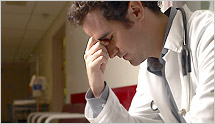The Takeway
- Most adults require approximately 8 hours of sleep per 24 hours, but there can be substantial differences among individuals. Sleep needs may range from about six to nine hours.
- The circadian rhythms generated by our internal biological clocks vary from individual to individual; most clocks run slightly longer than 24 hours, while some run slightly shorter.
- Individual differences in normal sleep requirements and circadian rhythms are likely to be genetically determined—at least in part.
- Ongoing research seeks to understand genetic predispositions to different patterns of sleep, and risks of sleep and circadian rhythm disorders. Knowledge of the genetic changes that affect sleep may help us improve sleep and health, and ultimately understand the functions of sleep.
Sleep is such a familiar part of our daily life that we may take it for granted. However, like many essential physiological functions, sleep is related to many behavioral, environmental, and genetic factors. This essay describes, in brief, the role that genetics plays in sleep and sleep disorders.
Defining Normal Sleep

The amount of sleep a person needs—as well as his or her preference for waking early or staying up late—varies from individual to individual. Some of these variations in sleep duration and timing, like many other characteristics, such as eye or hair color, are genetically determined. In addition to genetic influences, there are cultural, environmental, and behavioral factors that influence when and how much we sleep. For example, many people living in hot climates have an afternoon siesta to avoid activities in the mid-day sun, and consequently have shorter sleep duration at night. The amount of sleep that people obtain is also affected by medical disorders and medications.
Determining exactly how much sleep a person requires usually involves having that individual live in a laboratory environment for a number of days and nights, without other commitments, and allowing them to sleep as much as they wish. Such laboratory studies have revealed that most adults, on average, need between seven and nine hours per night. However, a given individual may be outside that range: some people need as little as six hours, and others require slightly more than nine. A rough idea of how much sleep you need can be obtained by going on "vacation" for several days, going to sleep when you feel sleepy and waking up spontaneously. Assuming you are refreshed when you wake up, the hours you slept are your sleep need.
"Larks" and "Owls": The Genetics of Circadian Rhythms
Humans are a diurnal species, meaning that we are generally active during the day and sleep at night. Some individuals feel more awake, alert, and able to do their best work in the morning. We typically refer to these people as "larks," or morning-type individuals. Others have a hard time waking up or feeling alert in the morning and feel that they are most productive in the evening or night. We refer to these people as "owls," or evening-type people.

What determines our desire to wake with the sun or, conversely, burn the midnight oil, is influenced by the same system that regulates the cycling of many bodily functions. Our internal biological clock resides in the brain and regulates the timing of functions such as appetite, hormone release, and metabolism. Of all the cycles controlled by the circadian system, perhaps the most obvious is the sleep-wake cycle—when we go to sleep and when we wake up.
Although our internal clock is set to approximately 24 hours, the exact timing of circadian rhythms varies from one person to the next. Differences in the speed of the circadian clock may help determine whether you are an "owl' or a "lark." For instance, there is some evidence that if your circadian clock runs faster than 24 hours, you may tend to be a "lark"; if your clock runs slower than 24 hours, you tend to be an "owl."
Although we often use the term "morning person" in fun, being a morning or night person is influenced by the genetics of how fast or slow our internal clocks tick. Genes influence how fast or slow our internal clock runs and, as a result, how closely it—and our body’s functions—align with the 24-hour day. Changes in these genes, known as mutations, from one generation to the next can affect the clock's timing. For example, this can cause a child to have a faster or slower clock than his or her parents.
Dr. Anne-Marie Chang describes how certain genes can affect whether an individual feels more alert and active in the morning or in the evening.
Although genetics plays an important role in whether you are a morning or evening type, there are several other factors that influence this characteristic. Age, daily work or school schedules, and other environmental, lifestyle, and social factors all play a role.
Circadian Rhythm Sleep Disorders
Some people have rather extreme preferences for sleep timing. For example, people who feel the need to go to bed very early in the evening—say between 7:00 and 9:00 p.m.—and have very early morning awakenings—say between 3:00 and 5:00 a.m.—are classified as having advanced sleep phase syndrome (ASPS). Because of their family and other social obligations, it may be difficult for these people to go to bed early enough to get sufficient sleep. And because early awakenings often occur even after late bedtimes, chronic sleep deprivation is common in people with ASPS.

The opposite extreme is called delayed sleep phase syndrome (DSPS), which is characterized by a very late bedtime and wake time. People with DSPS might go to bed after 2:00 a.m. and have difficulty waking up before 9:00 or 10:00 a.m. In this case, they may have trouble fulfilling school or work obligations. Even if they manage to wake up early, they have trouble falling asleep earlier than 1:00 or 2:00 a.m., again resulting in shortened sleep.
Each of these conditions may result from mutations in one or more of our internal clock genes, which code for proteins that are responsible for timekeeping in our cells. Treatment for these conditions includes specifically timed exposure to light—later in the evening for those with ASPS, earlier in the morning for those with DSPS—in an effort to reset the internal circadian clocks to more appropriate phases.
Narcolepsy
Research suggests that other sleep disorders also have a genetic component. Narcolepsy is a neurological disorder characterized by daytime sleepiness, cataplexy (or sudden paralysis), hallucinations at sleep onset, and disturbed nighttime sleep. While there is an increased chance of having narcolepsy if one's relatives have it, the heritability of narcolepsy is complex. In 1999, researchers discovered that a specific gene causes symptoms in mice and dogs that looked like the symptoms that were associated with narcolepsy in humans. The narcolepsy gene in those animals produces a protein in the brain (called orexin, or hypocretin) that promotes wakefulness. In humans, the cells in the brainstem area called the hypothalamus which produce orexin die off resulting in narcolepsy (see Understanding how narcolepsy develops.
Sleep Apnea
Research is underway to identify the gene or genes that place people at risk for sleep apnea, an extreme form of snoring in which an individual's airway becomes partially or completely blocked, leading to repetitive awakenings and reductions in blood oxygen levels. The research is complex because there are likely to be multiple genes involved. In addition, sleep apnea may be caused by varied factors in different individuals. For instance, different genes may be responsible for helping define the shape of the airways, the control of the muscles surrounding the throat, and the overall control of breathing—all of which may cause or worsen sleep apnea. Furthermore, such genetic factors must be distinguished from others that might underlie conditions commonly associated with apnea, particularly obesity and hypertension.
Other Genetic Variations That Affect Sleep
Researchers have found that some people with a slight genetic variation in one or more genes are much more vulnerable to the adverse effects of sleep loss than the average person. (Staying awake for 24 consecutive hours is one example of sleep loss.) Somewhere between 10 and 20 percent of the population have this type of condition. For example, if a person has a mutation that results in a sleep system that sends out a very strong drive to sleep, he or she may be much less likely to develop insomnia than the average person. However, he or she may have much more difficulty coping with a job that requires working a 24-hour shift (as often occurs for physicians during their residency training).
As researchers continue to study the function and variation in circadian genes and how they influence all systems and cycles in the body, we are likely to learn much more about the mechanisms of sleep, wakefulness, and the many cycles within both of those states. Understanding the genetics of the biological clock will also further the development of treatment options for those individuals who are afflicted with genetically associated sleep disorders.
References
- Ebisawa T. Circadian rhythms in the CNS and peripheral clock disorders: human sleep disorders and clock genes. Journal of Pharmacological Sciences. 2007;103:150-154.
- Raizen DM, Mason TB, Pack AI. Genetic basis for sleep regulation and sleep disorders. Seminars in Neurology. 2006; 26:467-483.
- Taheri S, Mignot E. The genetics of sleep disorders. Lancet Neurology. 2002; 1:242-250.